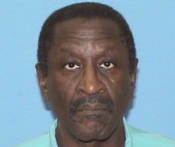Heidelberg Speaks Out From Prison, Nearly Half a Century After Arrest

73-year-old Cleve Heidelberg has been in prison for the past 46 years for the murder of a police officer. Heidelberg has maintained his innocence since his arrest in 1970. A petition to reopen his case is being reviewed by a Peoria County 10th District Circuit Court judge. Illinois Dept. of Corrections
This week, 73-year-old Cleve Heidelberg will have spent exactly 46 years in prison. Heidelberg, a black man, was convicted of murdering a Peoria County Sheriff’s sergeant in 1970. Since that time, Heidelberg has filed numerous petitions arguing his innocence.
Cleve Heidelberg says the last 46 years of his life have been spent in “the grave.”
“All the steel and concrete that surrounds me. A prisoner, we are economically, we are socially, we’re dead. So I’m like a dead man coming back to life,” said on a recent phone call from the Hill Correctional Center in Galesburg.
Heidelberg’s story is being brought back to public view in a recent court filing and an upcoming documentary. That’s despite years of his own attempts.
He’s filed letters to the governor and several petitions in US District Court in Peoria. One of those petitions was filed the day before his trial. All of his attempts were dismissed.
Heidelberg says this time, he’s hopeful. His attorneys are examining evidence recovered from the crime scene. They argue results from an FBI testing conducted in 1970 prove Heidelberg’s innocence. Those findings never surfaced in the courtroom during trial.
“All of that evidence exonerates me from using the weapon, from participating in that crime or from even being in my automobile at that time and on that date,” Heidelberg said.
May 26, 1970. Heidelberg was 27 years old and a technician at Caterpillar. Heidelberg alleges that he loaned his car that night and later received a call that the vehicle crashed on Peoria’s South Side. Police reports and witness’ testimony confirm that minutes before the crash, a robbery and murder took place at the Bellevue Drive In.
Witnesses of the incident say the suspect sped away from the crime scene in Heidelberg’s car. When Heidelberg approached his crashed vehicle, several arresting officers were there.
“I felt them throw some handcuffs on me, and at the same time, I was hit in the back of the head with something,” Heidelberg said.
Records show Heidelberg was taken to the hospital for stitches before appearing in the police lineup that night.
“It’s possible somebody kicked him. I’m not going to sit here and tell you that didn’t happen,” retired Peoria County Sheriff’s Deputy Emanuel Manias said.
Manias wasn’t working the night of the incident, but he led the investigation that brought Heidelberg’s conviction. Manias says such a police response may have been more commonplace in 1970s Peoria.
“I don’t condone beating the heck out of somebody, but also things were done back then a little different,” Manias said.
Witnesses of the arrest allege in court testimony that during the struggle, one of the arresting officers shouted to “kill” Heidelberg.
“I could see that happening because it’s not looked at lightly when somebody kills a police officer,” Manias said. “Maybe somebody said it in the background, cause if they said it and were sincere about it, they probably would have shot him.”
Cleve Heidelberg says that’s one reason why his case should get tried again in 2016. So he can get what he says his trial lacked -- the presumption of innocence.
“That means if we are suspected of a crime, that the police and the courts are supposed to presume that we innocent of that,” Heidelberg said.
Heidelberg and his attorneys await a decision from Peoria County Judge Al Purham, who was assigned to the case just last week. Chief Judge Stephen Kouri says typically, the next step in the process would be a status hearing.
While that’s pending, Heidelberg says he’s struggling to stay alive. He says he has congestive heart failure and a whole host of health issues at age 73. But even if he doesn’t live to see the outside of prison, he says his life still serves a purpose.
“Maybe part of that plan is for me to speak out, for those victims, or those people who have been wrongly convicted, for those people for me to shout for them, from the grave,” Heidelberg said.
If he manages to leave “the grave” or in other words, get exonerated, Heidelberg says he plans to advocate for inmates’ rights.
